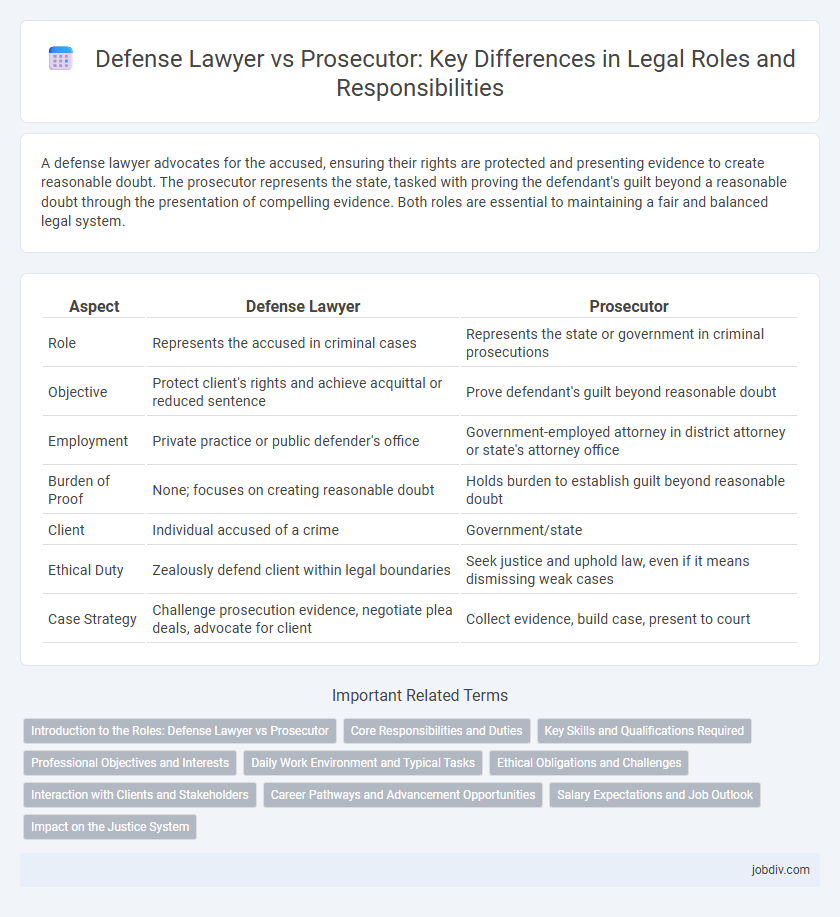A defense lawyer advocates for the accused, ensuring their rights are protected and presenting evidence to create reasonable doubt. The prosecutor represents the state, tasked with proving the defendant's guilt beyond a reasonable doubt through the presentation of compelling evidence. Both roles are essential to maintaining a fair and balanced legal system.
Table of Comparison
| Aspect | Defense Lawyer | Prosecutor |
|---|---|---|
| Role | Represents the accused in criminal cases | Represents the state or government in criminal prosecutions |
| Objective | Protect client's rights and achieve acquittal or reduced sentence | Prove defendant's guilt beyond reasonable doubt |
| Employment | Private practice or public defender's office | Government-employed attorney in district attorney or state's attorney office |
| Burden of Proof | None; focuses on creating reasonable doubt | Holds burden to establish guilt beyond reasonable doubt |
| Client | Individual accused of a crime | Government/state |
| Ethical Duty | Zealously defend client within legal boundaries | Seek justice and uphold law, even if it means dismissing weak cases |
| Case Strategy | Challenge prosecution evidence, negotiate plea deals, advocate for client | Collect evidence, build case, present to court |
Introduction to the Roles: Defense Lawyer vs Prosecutor
A defense lawyer represents the accused, ensuring their legal rights are protected and challenging the prosecution's evidence to establish reasonable doubt. The prosecutor, as a government attorney, initiates and conducts criminal proceedings, advocating to prove the defendant's guilt beyond a reasonable doubt. Both roles are fundamental to the adversarial legal system, maintaining balance between safeguarding individual rights and enforcing justice.
Core Responsibilities and Duties
Defense lawyers protect the legal rights of the accused by providing representation, advising clients on plea deals, and challenging evidence presented by the prosecution. Prosecutors are responsible for presenting the case against the accused by gathering evidence, interviewing witnesses, and pursuing charges to prove guilt beyond a reasonable doubt. Both roles require thorough knowledge of criminal law and adherence to ethical standards to ensure a fair trial.
Key Skills and Qualifications Required
Defense lawyers require strong skills in legal research, client advocacy, and negotiation to protect their clients' rights effectively. Prosecutors must possess thorough knowledge of criminal law, persuasive courtroom presentation skills, and the ability to analyze evidence critically to prove a defendant's guilt. Both roles demand impeccable ethical standards, excellent communication abilities, and a deep understanding of trial procedures to succeed in the adversarial legal system.
Professional Objectives and Interests
Defense lawyers prioritize protecting the rights of the accused, ensuring a fair trial, and seeking acquittal or reduced sentencing based on evidence and legal arguments. Prosecutors focus on proving the defendant's guilt beyond a reasonable doubt, upholding justice by enforcing laws, and safeguarding public interests through appropriate penalties. The professional interests of defense lawyers revolve around client advocacy and legal defense strategies, while prosecutors are driven by public safety, deterrence, and maintaining the integrity of the criminal justice system.
Daily Work Environment and Typical Tasks
Defense lawyers primarily conduct client consultations, negotiate plea deals, and prepare case strategies by reviewing evidence and interviewing witnesses within law offices and courtrooms. Prosecutors spend much of their day evaluating investigation reports, filing charges, presenting cases at trials, and coordinating with law enforcement agencies in government offices and court settings. Both roles require extensive legal research, drafting motions, and frequent courtroom appearances to advocate for their respective positions.
Ethical Obligations and Challenges
Defense lawyers and prosecutors navigate distinct ethical obligations, with defenders prioritizing client confidentiality, zealously advocating for the accused, and ensuring a fair trial, while prosecutors must seek justice, avoid prosecuting without probable cause, and disclose exculpatory evidence. Challenges arise as defense attorneys balance vigorous representation against legal boundaries, and prosecutors face pressures to secure convictions without compromising impartiality or fairness. Both roles demand adherence to professional conduct codes to uphold the integrity of the judicial system.
Interaction with Clients and Stakeholders
A defense lawyer maintains direct and confidential communication with clients to protect their rights and build a strong case, often managing sensitive information with discretion. Prosecutors interact primarily with law enforcement agencies, victims, and witnesses, coordinating evidence gathering and presenting the case on behalf of the state. Both roles require clear and strategic communication to navigate complex legal processes and achieve just outcomes.
Career Pathways and Advancement Opportunities
Defense lawyers typically begin their careers by gaining experience in public defender offices or private law firms specializing in criminal defense, with advancement opportunities including senior defense counsel or partnership roles. Prosecutors often start as assistant district attorneys or government attorneys, with clear pathways to roles such as senior prosecutor, chief prosecutor, or elected district attorney, leveraging courtroom experience and community engagement. Both career paths require continuous legal education and can lead to specialized positions in federal or appellate courts, enhancing professional growth and influence.
Salary Expectations and Job Outlook
Defense lawyers typically earn an average salary ranging from $60,000 to $120,000 annually, depending on experience and geographic location, while prosecutors often have a slightly lower starting salary, generally between $50,000 and $110,000. Job outlook for both roles shows steady growth at approximately 7% over the next decade, driven by ongoing legal needs and criminal justice reform. Prosecutors may benefit from government job stability and benefits, whereas defense lawyers working in private practice can experience wider salary variability but potential for higher earnings.
Impact on the Justice System
Defense lawyers uphold defendants' constitutional rights, ensuring fair trials and preventing wrongful convictions by challenging evidence and advocating for due process. Prosecutors represent the state's interest in enforcing laws and seeking justice for victims, balancing aggressive case building with ethical responsibilities. Their adversarial roles create checks and balances that maintain the integrity and effectiveness of the justice system.
Defense Lawyer vs Prosecutor Infographic

 jobdiv.com
jobdiv.com